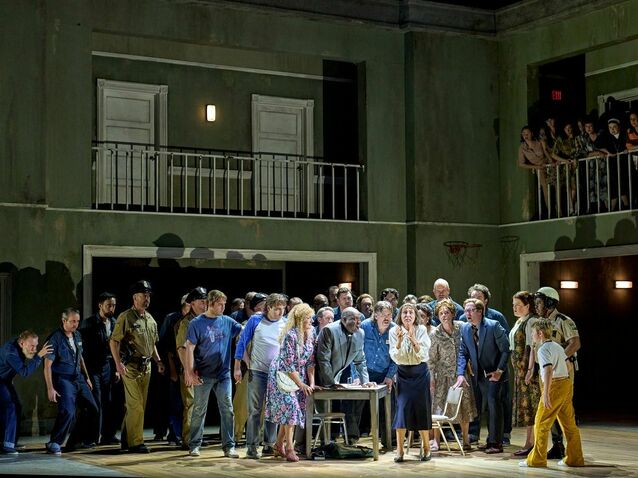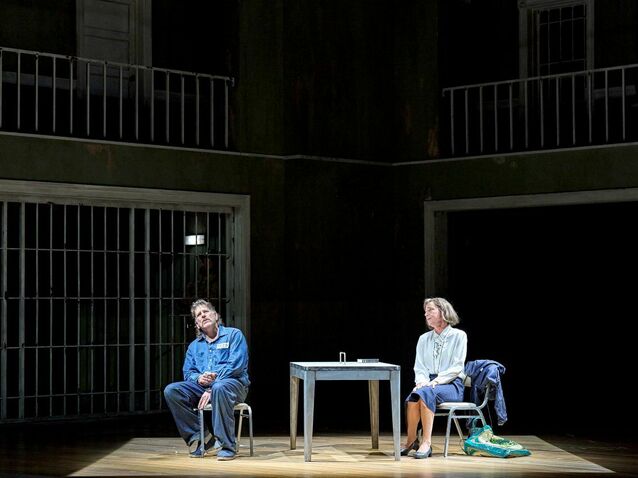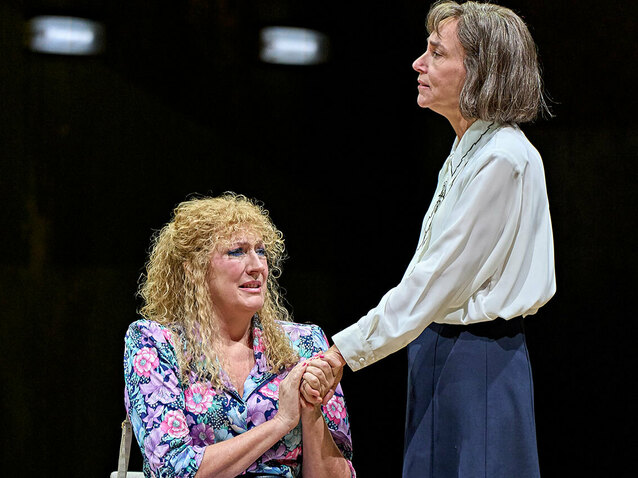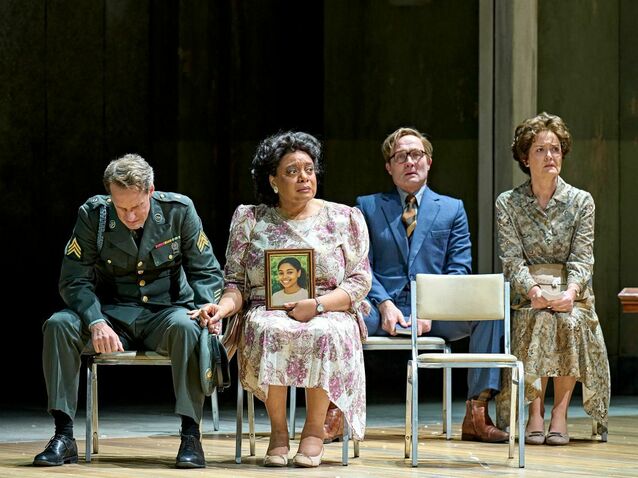 ENO’s Dead Man Walking 2025 © Manuel Harlan
ENO’s Dead Man Walking 2025 © Manuel Harlan
Jake Heggie’s Dead Man Walking, with a libretto by Terrence McNally, premiered in 2000 at the War Memorial Opera House, San Francisco, and has appeared at The Metropolitan Opera. In spite of this, it has only ever enjoyed a smattering of outings in the United Kingdom, including a semi-staged performance at the Barbican in 2018, and productions by Welsh National Opera and the Guildhall School of Music & Drama in 2019 and 2023 respectively. In fact, Annilese Miskimmon’s new staging for English National Opera, which constitutes a co-production with Opera North and Finnish National Opera and Ballet, represents the first time that the work has appeared at one of London’s major houses.
It is based on Sister Helen Prejean’s eponymous book, which also inspired Tim Robbins’ 1995 film. The book recalls her encounters in the 1980s with two inmates in Louisiana State Penitentiary who faced the death penalty. In the opera the single prisoner Joseph De Rocher becomes a hybrid of both of these real people, while the events depicted draw on Sister Helen’s actual experiences. Sister Helen in both the opera and real life (she is now 86) is vehemently opposed to capital punishment, believing that a society that teaches its citizens that the way to deal with difficult problems is to kill them cannot then expect its people to behave otherwise.
The opera sees her establishing a supportive relationship with Joseph, who has been found guilty of assaulting and murdering two teenagers. She hopes his death sentence can be quashed, and takes the steps she can to try to secure this, including telling his mother what to say at the Pardon Board. She fails in her aim, but the more she is perceived as fighting his corner the more the victims’ families see her as the enemy. This hurts her because she does feel their pain, but any attempts she makes to comfort them incite their wrath as they accuse her of being disrespectful and wanting it both ways.

Michael Mayes, Christine Rice, ENO’s Dead Man Walking 2025 © Manuel Harlan
Heggie’s score, which is superbly conducted on this occasion by Kerem Hasan, is very strong at generating atmosphere and capturing changes in mood. For example, when Sister Helen first meets Joseph he finally opens up to her and almost falls into a dreamlike state as he describes what to him makes life worthwhile. Then the guard announces there are five minutes left, which breaks the spell and sees Joseph become frantic once more at thoughts of his fate.
There are times when sounds coming across a radio are conveyed, while the children with whom Sister Helen works sing ‘spiritual’ hymns that, although not ironic in themselves, can create irony because of the context in which they are sung. This leads to a powerful moment towards the end of Act I when Joseph is confronted with the youths singing while Sister Helen is surrounded by, it would seem, all of the forces in the system that act against her. There are also a wide variety of influences on the music, with there even being a few allusions to ‘rock and roll’ when Sister Helen recalls going to Las Vegas and seeing Elvis Presley.
It could be suggested that if someone is going to write a piece exposing the injustices of the death penalty, Joseph’s is not the best case to use. This is because he is certainly guilty of a heinous crime, whereas a more ambiguous case might have better highlighted the risk of killing an innocent person. Overall, however, it is easy to hook into the opera’s arguments against capital punishment, which include the fear and uncertainty that the timescales involved generate, and the actual cruelty involved in lethally injecting someone. Above all, the case against the very principle feels powerful, as the opera questions whether any human being ever has the right to take another life, if anyone is truly beyond redemption, and whether ‘revenge’ of this type really benefits anyone.
Occasionally there is a point that does not quite ring true. Throughout the opera Joseph protests his innocence arguing that his brother committed both murders but had a better lawyer, and Sister Helen desperately tries to get him to confess to what he did believing in the healing power of honesty. He finally does so at the end, but until then his mother believes his proclamations of innocence and it is hard to know why she is so ready to accept them. While it is easy to see how a parent could genuinely convince herself of anything out of love for her son, in this instance accepting Joseph’s innocence would mean acknowledging another son’s total guilt, which it is hard to imagine her doing. One could argue she is so distraught she has simply not thought through the implications of her own conviction, but it comes perilously close to feeling like a ‘continuity’ error.

Sarah Connolly, Christine Rice, ENO’s Dead Man Walking 2025 © Manuel Harlan
If a few such flaws can be identified, however, Miskimmon’s production goes a long way to minimising their influence, so that the opera and staging work together to create a highly impactful evening. Alex Eales’ two tiered set, comprising two walls with balconies set at a ninety degree angle to each other, is used to represent Hope House, run by the Sisters of St Joseph, in New Orleans, and the Louisiana State Penitentiary in Angola. The smallest of changes, such as the removal of crosses from the doors and the addition of bars to one of the entrances, convert it from one place to the other, and the similarity of the two settings paradoxically highlights the extremes of how different people choose to live their lives. The Sisters at Hope House do not enjoy a privileged existence, as their own surroundings are quite Spartan, but they work with what they have to do what they can.
A car is introduced to the stage on several occasions, being pushed on and off by the performers or people in appropriate costumes. This is seen to particularly good effect when Sister Helen first makes the long drive to see Joseph in Angola. When it would have been so easy to resort to moving background projections to show how she was travelling, the act of enabling the audience to focus solely on her produces dividends, and an encounter she has on the way with a Motorcycle Cop (a splendid Zwakele Tshabalala) leaves its mark.
There are some insightful touches throughout, so that Sister Helen’s complaint that her black Datsun makes her drive particularly hot is supported by the fact that the engine is smoking by the time she reaches her destination. When she first meets Joseph he is behind a large screen, but with each subsequent encounter as they grow closer this becomes smaller and disappears, and for their final meeting his wrists are not even chained. At the same time, having the two murdered teenagers silently return to the stage on occasions means that we never forget the victims of Joseph’s crime.

Jacques Imbrailo, Gweneth Ann Rand, Hubert Francis, Catherine Carby, ENO’s Dead Man Walking 2025 © Manuel Harlan
Christine Rice, with her brilliant mezzo-soprano, is an excellent Sister Helen who reveals how her strong beliefs take their toll on her as much as they spur her on, because she is ultimately a human being with the same frailties as anyone else. As an experienced Joseph, Michael Mayes reveals an immensely powerful baritone and thoroughly convinces us that within the person who carried out such an abominable act there is genuine desperation and vulnerability. Dame Sarah Connolly is a class act as Joseph’s mother, while there is sound support from Madeline Boreham as Sister Rose, Ronald Samm as Father Grenville and Andrew Manea as Warden George Benton.
Some of the most effective moments come when the parents of the murdered teenagers (played by Gweneth Ann Rand, Jacques Imbrailo, Catherine Carby and Hubert Francis) confront Sister Helen over her supposed support for the man who took their children’s lives. Heggie exploits the medium of opera to have all four of them bombard her with statements and questions that make a series of points. As they assert that she does not know what it is like to give birth to and raise a child, in the context of highlighting the magnitude of their loss, they cut her to the quick because as a celibate person she has indeed missed out on that experience. With his superb baritone, Imbrailo is particularly affecting as one of the two fathers, Owen Hart, as he ‘explodes’ in despair before moving away from simply wanting to see the killer dead to wondering in what way that will achieve closure for him or, by extension, anyone at all.
By Sam Smith
Dead Man Walking | 1 - 18 November 2025 | London Coliseum
the 02 of November, 2025 | Print
Comments